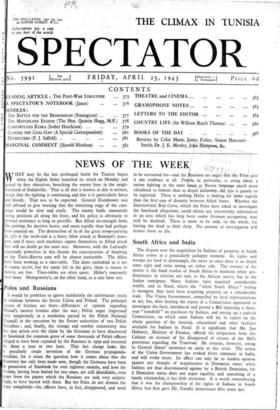South Africa and India
The dispute over the acquisition by Indians of property in South Africa comes at a particularly unhappy moment. Its rights and wrongs are hard to disentangle, the more so since there is no doubt some right and some wrong on either side. The essence of the matter is the fixed resolve of South Africa to maintain white pre- • dominance in relation not only to the African native, but to the Indian immigrant. Many Indians have acquired considerable wealth, and in Natal, where the " white South Africa " feeling is strongest, they have been acquiring property on a considerable scale. The Union Government, compelled by local representations to act, has, after hearing the report of a Commission appointed to investigate the facts, introduced and passed a Bill imposing a three- year "standstill" on purchases by Indians, and setting up a judicial Commission, on which some Indians will sit, to report on the whole question of the housing, educational and other facilities available for Indians in Natal. It is significant that Mr. Jan Hofmeyr, Minister of Finance, offered his resignation from the Cabinet on account of his disapproval of certain of the Bill's provisions regarding the Transvaal. He remains, however, owing to General Smuts' insistence on unity at this crisis. The action of the Union Government has evoked bitter comment in India, and will evoke more. Its effect can only be to harden opinion against any thought of acquiescence in Dominion status when Indians are thus discriminated against by a British Dominion, for if Dominion status does not argue equality, and something of a family relationship, it has little attraction. It is worth remembering that it was his championship of the rights of Indians in South Africa that first gave Mr. Gandhi prominence fifty years aeo.


























